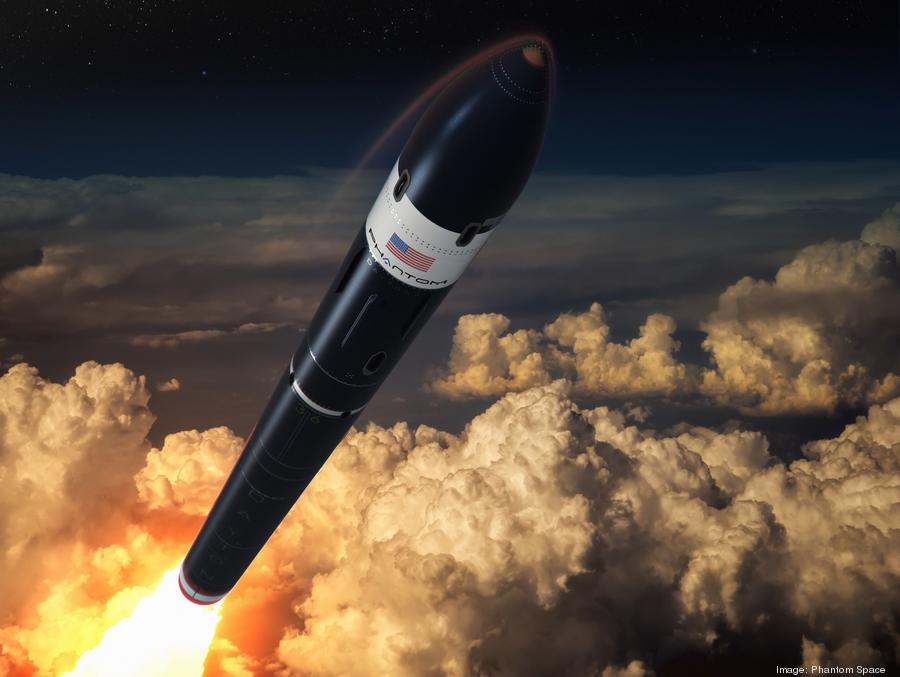Phantom Space CEO Jim Cantrell wants to change the way we think about industrializing space

Jim Cantrell, founder and CEO of Tucson-based Phantom Space, has already established himself as a luminary in the aerospace industry, but he wants to cement his legacy by changing the way businesses get into space.
“We’re talking about industrializing space, and to do that, we’ve got to have reliable transportation,” he said. “This will be a legacy I can leave behind as the intellectual father of this concept, and I just want to prove that it will work. I’m just not willing to give up on it, I’m just not.”
Cantrell was previously the first vice president of business development at SpaceX, the space exploration company owned by Elon Musk, and before that he worked at the French Space Agency (CNES) and NASA Jet Propulsion Lab.
Cantrell’s vision for Phantom Space is grand, but it starts with simply making it easier for companies to send things into space. This idea of reliable and frequent launches means Phantom is rethinking the rocket manufacturing process.
Phantom Space’s launch services will, in a few years’ time, see company rockets loaded with customer payloads and blasted into the atmosphere. Customers will be able to send up payloads bearing all kinds of technology, like imaging or weather tracking equipment.
When thinking about mass production of rockets, Cantrell draws the comparison to Henry Ford and the way he streamlined production of the car or to the process of building a website, which used to be reserved for an exceptionally skilled few and now can be done by most everyone thanks to new tools.
Phantom expects to make its first launch in early 2023 and it plans to charge its customers $4 million for a dedicated launch.
“I don’t think people understand the potential of commercializing space,” Cantrell said. “It’s been an industry that would be the equivalent of the government making the iPhones for so many years. And what excites me, is all the money now that’s driving into this, which will drive the change.”
Funding for the industry
Phantom Space is lining itself up to compete with other dedicated launch companies like California’s Astra (Nasdaq: ASTR) and Texas-based Firefly Aerospace, both of which have hauled in tens of millions of venture capital dollars.
Phantom Space announced its presence back in April, along with the news it had raised a $5 million seed round.
Cantrell said the Phantom team is small, with about 30 employees set up at the company’s factory facility in Tucson that contains about 32,000 square feet of manufacturing space.
Phantom is not Cantrell’s first Tucson space startup. He previously founded Vector Launch, a company that raised more than $90 million in VC funding over several years, before it went bankrupt in 2019.
But Phantom is charting a different course than Vector; For example Vector wanted to build its own engines (the most vexing part of rocket construction) whereas Phantom is using engines built by Colorado-based Ursa Major, sparing them from hiring dozens of engineers.
“We’ve gotten to this point today for less than $6 million. We’re pretty proud of that because we’ve done it with a very small crew, and a very productive crew,” Cantrell said. “We focus on getting it done, and getting there fast.”
Other business models
Launch services are the first revenue stream that Cantrell foresees, but Phantom Space aims to be more than the company that sends rockets up with customer payloads.
Phantom intends to make hundreds of launches each year and to do so it will need access to lots of launch ports. Cantrell said they’re working on securing access at Vandenberg Air Force Base in California, Cape Canaveral in Florida and at ports in Alaska and Sweden as well.
Acquisition has also been a key growth strategy for the company thus far. Phantom bought StratSpace (another company that Cantrell founded) in May and Florida-based Micro Aerospace Solutions in August.
Beyond just building and launching the rockets, Phantom also intends on building out the satellite payloads for its customers as well. Cantrell said this will make Phantom a vertically integrated, one-stop-shop for its business customers looking to design, manufacture and launch payloads into space.
Phantom has already secured one such deal with Scottsdale-based Ingenu, under which Phantom will build and launch 72 Internet of Things-enabling satellites for Ingenu.
Lastly, Cantrell said Phantom will build its own “space applications” to put on the rockets and that this will, one day, be the main source of revenue for the company.
The first application he noted is called the Phantom Cloud, an orbital mesh network that other satellites will access to broadcast their data back to Earth in real time as opposed to waiting to broadcast once the satellite is above an overground station.
